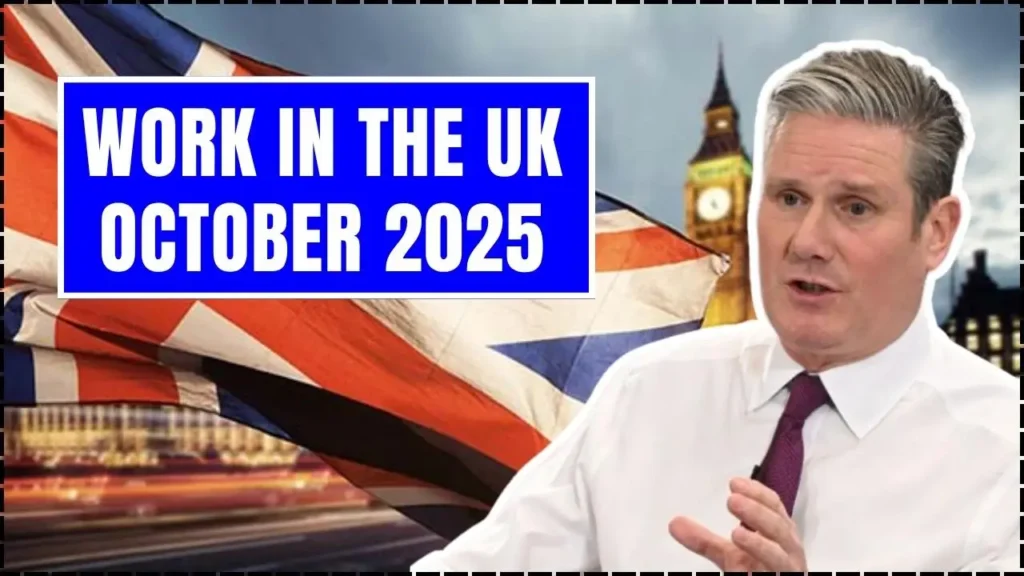From October 2025, the UK begins accepting applications for several 2025 work visa routes under revised immigration regulations.

Key changes include raised salary thresholds and stricter skill requirements for the Skilled Worker visa, plus updated options for no-job-offer routes like the Graduate visa and High Potential Individual scheme.
Prospective applicants must understand the new rules to apply successfully.
Work in the UK October 2025
| Key Fact | Detail | Source / Note |
|---|---|---|
| Skilled Worker salary threshold | From 22 July 2025, general threshold is £41,700 or higher “going rate” | GOV.UK “Skilled Worker visa: Your job” |
| Skill level raised | Applicants now generally need roles equivalent to RQF Level 6 (degree-level) | DLA Piper / Imm. Rules changes |
| Temporary Shortage List (TSL) | Some medium skill roles allowed only if listed on TSL | GOV.UK TSL guidance |
| Visa routes without job offer | Includes Graduate visa, Global Talent, Youth Mobility Scheme, HPI visa | GOV.UK “Work in the UK” pages |
With work visa applications opening in October 2025 under revised rules, prospective migrants and employers face a more demanding compliance environment. The success of the new framework will depend on clarity in implementation, effective communication, and whether transitional protections adequately buffer affected applicants.
Over the coming months, outcomes will show whether the changes strike the intended balance between control, competitiveness, and fairness.
New Rules & Policy Shifts
Revised Skilled Worker Rules
A major reform came into force on 22 July 2025, altering the central criteria for the Skilled Worker visa. The general salary threshold was raised to £41,700 per year or the job’s “going rate” — whichever is higher.
In addition, the skill requirement has been elevated from RQF Level 3 (A-level equivalent) to RQF Level 6 (degree equivalent). Roles classified at RQF Levels 3–5 are now largely excluded unless they appear on the Temporary Shortage List (TSL).
The UK government also ended new overseas recruitment for social care worker occupations starting from that date.
Under the updated rules, applicants may use tradeable points options (e.g. PhD, new entrant status, roles on Immigration Salary List) to qualify under slightly lower salary floors in certain cases.
Other Visa Routes & Non-Sponsor Options
Not all work visa routes require a job offer. Key non-sponsored options include:
- Graduate Visa: For recent graduates on a Student visa who wish to stay and work in the UK.
- Global Talent Visa: For those with recognized talent endorsements in science, arts, tech, etc. (listed among non-job–offer routes).
- Youth Mobility Scheme: Permits young people from certain countries to live and work in the UK for a defined period.
- High Potential Individual (HPI) Visa: For high academic achievers from top universities, without needing a job in advance.
- Temporary Work Visas: These include Charity Worker, Creative Worker, Religious Worker, Government Authorised Exchange, Seasonal Worker and other types.
Transition and Legacy Protections
Some leeway is offered for those already on visa routes predating the rule changes:
- Applicants who held a Skilled Worker visa or Certificate of Sponsorship before the 22 July 2025 change may benefit from transitional protections under old thresholds when extending or switching.
- In Scotland, for example, those already on a Skilled Worker visa before 22 July continue under the previous rules for extensions or switching.
Application Process & Key Requirements
What Applicants Must Do
- Secure a UK sponsor (for the Skilled Worker route) that holds a valid licence and issue a Certificate of Sponsorship (CoS).
- Meet English language requirements and financial thresholds (or show sufficient funds) unless exempted.
- Provide supporting documents: identity, qualifications, proof of salary, etc.
- Apply early: applications can be submitted up to 3 months before the intended start date.
- Switching or extending: those already in the UK on other visas may apply to switch to Skilled Worker, provided they meet the new requirements and apply before their current visa expires.
Processing Times
- For applications made from outside the UK, decisions often arrive within 3 weeks, provided documentation is in order.
- For switch or extension applications from within the UK, typical processing times are around 8 weeks.
- Priority / expedited services may be available for additional fees, depending on visa type and location.
Related Links
DWP Winter Fuel Payment Date Confirmed for 2025
DWP Pension Update – New Bank Rules All UK Pensioners Must Follow From October 2025
DWP Pension Update – New Bank Rules All UK Pensioners Must Follow From October 2025
Challenges, Risks & Advice
Impacts & Concerns
- Many roles that previously qualified (especially mid-skill ones) are now excluded unless listed on the TSL.
- Employers must review job classifications, salary offers, and SOC codes to ensure compliance or risk licence revocation or visa refusals.
- Some applicants may face tougher competition or find it harder to meet stringent thresholds.
- Clarity over transitional provisions and communication from Home Office will be vital to minimize confusion.
Recommendations for Applicants
- Map your role accurately to the correct SOC code and check whether your job is eligible.
- Confirm salary meets both general threshold and the job’s going rate, whichever is higher.
- If your role is medium skilled (below degree level), check whether it appears on the Temporary Shortage List (TSL).
- Assess alternative routes (Graduate, HPI, Global Talent) if you cannot qualify for Skilled Worker.
- Seek expert guidance from immigration advisors to navigate complexity, especially with transitional rules.












 Claim Here!
Claim Here!